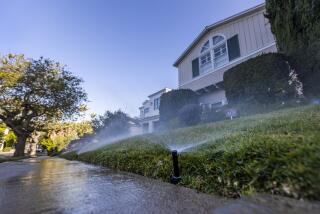Water Emergency Declared in Ventura : Conservation: The City Council delays discussion of a rationing proposal after agreeing that a drought-related shortage exists.
- Share via
The Ventura City Council declared a water shortage emergency early Tuesday morning after a lengthy public hearing in which dozens of residents begged for exemptions and proposed alternatives to the city’s stringent water conservation proposal.
The council voted unanimously to declare the emergency but postponed discussion on the water conservation ordinance. Mayor Richard Francis said he was exhausted after hearing more than five hours of public testimony that stretched the Monday evening session into Tuesday morning.
“I don’t think there’s a reasonable person in this city who doubts there’s a drought,” Vice Mayor Donald Villeneuve said after introducing the emergency resolution.
But the murmurs from the 20 or so residents who remained in the City Council chambers to witness the vote made it clear that not everyone agreed that the city needs the type or magnitude of the proposed water conservation measures.
City officials said that because of low rainfall over the past three years, water reserves from the Ventura River, which is the major supplier of water to eastern Ventura, are about one-third short of demand. The Lake Casitas Reservoir, which supplies west Ventura, have dwindled too, officials said.
Because of complicated legal arrangements between the city and the Lake Casitas Water District, the district only provides enough water to cover the west side’s needs, further compounding the city’s problems.
The draft ordinance outlines water quotas for residences, businesses and institutions, with penalties of up to 10 times the normal water rate for excessive use.
Residents would be given fixed quotas, plus bonuses based on their average use over the past three years, if their average exceeds their allocation. Residents of single-family houses would receive one-third more water than residents of apartments, condominiums and mobile homes.
Businesses, institutions and fruit growers would be forced to reduce water usage between 15% and 20% but would not be regulated by a quota system.
Another provision would ban all new water service hookups, which amounts to a moratorium on new construction.
The council must decide among five options in implementing that provision. The most stringent would block the construction of 1,662 units, the least stringent would block 103 proposed units.
The city’s goal is to reduce water usage by 30%, Francis said.
Monday’s hearing was the second in as many weeks on water rationing. About 300 people packed the City Council chambers and spilled into an adjoining auditorium, where the meeting was shown on television monitors.
About 45 speakers disputed just about every provision of the proposed ordinance, although almost all acknowledged that the city had to take immediate action to conserve water.
Growth advocates blasted city officials for trying to eliminate hookups. They said city officials should more aggressively pursue alternative water sources, including state-owned water from Northern California.
“Just think of all the painters, plumbers, tile people, where would they all go?” if the city enacts a building ban, asked Ted Temple, who runs a small construction business. “This community has to maintain some sense of vitality.”
No-growth supporters criticized city officials for considering the use of state-owned water, which they contended would lead to further development.
“I’ve heard enough from these whining, cement-loving developers. . . . If we import state water, it’s all over for Ventura,” Bill Loci said.
City Manager John Baker told the audience that it is impossible to tailor the conservation ordinance to meet everybody’s needs. He said that is why an appeal process for residents who would suffer undue hardships from water rationing had been included in the ordinance.
More to Read
Sign up for Essential California
The most important California stories and recommendations in your inbox every morning.
You may occasionally receive promotional content from the Los Angeles Times.













